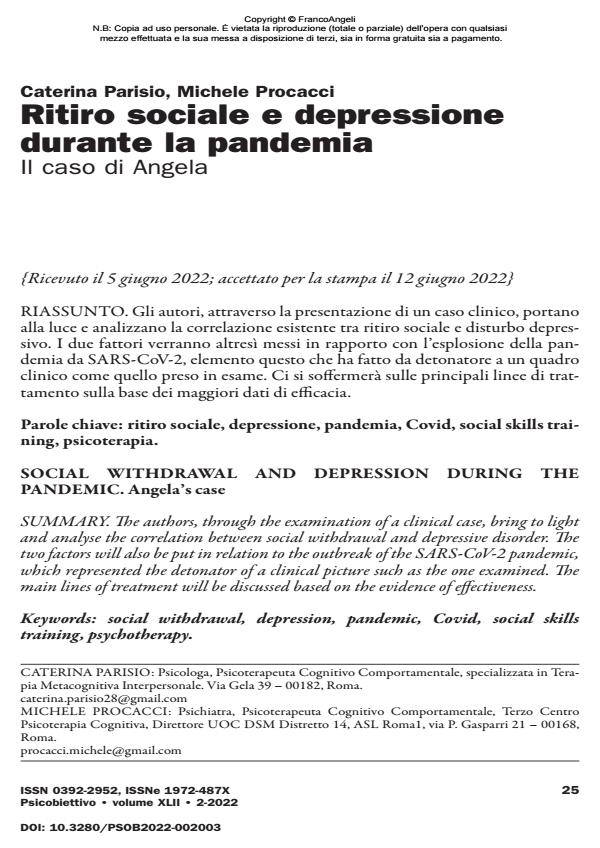Social withdrawal and depression during the pandemic. Angela’s case
Journal title PSICOBIETTIVO
Author/s Caterina Parisio, Michele Procacci
Publishing Year 2022 Issue 2022/2 Language Italian
Pages 12 P. 25-36 File size 640 KB
DOI 10.3280/PSOB2022-002003
DOI is like a bar code for intellectual property: to have more infomation
click here
Below, you can see the article first page
If you want to buy this article in PDF format, you can do it, following the instructions to buy download credits

FrancoAngeli is member of Publishers International Linking Association, Inc (PILA), a not-for-profit association which run the CrossRef service enabling links to and from online scholarly content.
The authors, through the examination of a clinical case, bring to light and analyse the correlation between social withdrawal and depressive disorder. The two factors will also be put in relation to the outbreak of the SARS-CoV-2 pandemic, which represented the detonator of a clinical picture such as the one examined. The main lines of treatment will be discussed based on the evidence of effectiveness.
Keywords: social withdrawal, depression, pandemic, Covid, social skills training, psychotherapy.
- Beck A.T. (1963). Thinking and Depression: Idiosyncratic Content and Cognitive Distortions. Archives of General Psychiatry, 9: 324-333.
- Beck A.T. (1964). Thinking and Depression: 2. Theory and Therapy. Archives of General Psychiatric, 10: 561-571.
- Beck A.T. (1967). Depression: Causes and Treatment. Philadelphia. University of Pensylvania Press (trad. it.: La Depressione. Torino: Bollati Boringhieri, 1978).
- Bellack A.S., Hersen M., Himmelhoch J.M. (1996). Social Skills Training for depression. A treatment manual. In: van Hasselt V.B., Hersen M. (eds.). Sourcebook of psychological teatment manuals for adult disorders. New York: Plenum Press, pp. 179-200. DOI: 10.1007/978-1-4899-1528-3_5
- Carcione A., Nicolo G., Semerari A. (2016). Curare i casi complessi. Roma-Bari: Laterza.
- Coplan R.J., Prakash K., O’Neil K., Armer M. (2004). Do You “Want” to Play? Distinguishing between Conflicted Shyness and Social Disinterest in Early Childhood. Developmental Psychology, 40(2): 244-258. DOI: 10.1037/0012-1649.40.2.244
- Cuijpers P., van Straten A., Warmerdam L. (2007). Behavioural activation treatments of depression: A meta-analysis. Clinical Psychology Review, 27: 318-326.
- De Sanctis B., Fadda S., Mancini F. (2019). Ritiro sociale nei disturbi dell’umore. Modello clinico e trattamento. In: Procacci M., Semerari A. (a cura di). Ritiro Sociale. Psicologia Clinica. Trento: Erickson.
- Eckhard R. (2018). Indicators of Social Isolation: A Comparison Based on Survey Data from Germany. Social Indicators Research, 139: 963-988. DOI: 10.1007/S11205-017-1741-Y
- Ehnvall A., Mitchell P.B., Hadzi-Pavlovic D., Parker G., Frankland A., Loo C., Perich T. (2014). Rejection sensitivity and pain in bipolar versus unipolar depression. Bipolar Disorders, 16(2): 190-198.
- Joiner T.E., Coyne J.C. (1999). The interactional nature of depression: Advances in interpersonal approaches. American Psychological Association.
- Joiner T.E., Katz J. (1999). Contagion of Depressive Symptoms and Mood: Metaanalytic Review and Explanations From Cognitive, Behavioral, and Interpersonal Viewpoints. Clinical Psychology: Science and Practice, 6(2): 149-164.
- Joiner T.E., Metalsky G.I., Katz J., Beach, S.R. (1999). Depression and Excessive Reassurance-Seeking. Psychological Inquiry, 10: 269-278.
- Kupferberg A., Bicks L., Hasler G. (2016). Social functioning in major depressive disorder. Neuroscience And Biobehavioral Reviews, 69: 313-332.
- Lakey B., Cronin A. (2008). Low Social Support and Major Depression: Research, Theory and Methodological Issues. In: Risk Factors in Depression. Amsterdam: Elsevier, pp. 385-408. DOI: 10.1016/B978-0-08-045078-0.00017-4
- Mazzucchelli T., Kane R., Rees C. (2009). Behavioral Activation Treatments for Depression in Adults: A Meta-analysis and Review. Clinical Psychology science and practice, 16(4): 383-411.
- Mullins L., Peterson L., Wonderlich S.A., Reaven N.M. (1986). The Influence of Depressive Symptomatology in Children on the Social Responses and Perceptions of Adults. Journal of Clinical Child Psychology, 15(3): 233-240. DOI: 10.1207/S15374424JCCP1503_6
- Procacci M., Semerari A. (2019). Ritiro Sociale. Psicologia Clinica. Trento: Erickson.
- Rainone A., Mancini F. (2004). Gli approcci cognitivi alla depressione. Milano: FrancoAngeli.
- Rubin K.H., Asendorpf J. (1993). Social Withdrawal, Inhibition, and Shyness in Childhood. UK: Psychology Press. DOI: 10.4324/9781315806891
- Rubin K.H., Bukowski W.M., Parker J G. (2006). Peer Interactions,
- Relationships, and Groups. In: Damon W., Lerner R.M. (series eds.), Eisenberg N. (vol. ed.). Handbook of Child Psychology: Vol. 3. Social, Emotional, and Personality Development. Hoboken, NJ: Wiley, 6th ed., pp. 571-645.
- Rubin K.H., Coplan R.J., Bowker J.C. (2009). Social Withdrawal in Childhood. Annual Review of Psychology, 60: 141-171.
- Segrin C. (2000). Social skills deficits associated with depression. Clinical Psychology Review, 20: 379-403.
- Segrin C., Dillard J.P. (1992). The interactional theory of depression: A meta analysis of the research literature. Journal of Social and Clinical Psychology, 11(1): 43-70.
- Serman T.E. (1996). Social ties and healt: the benefits of social integration. Annals of Epidemiology, 6: 442-451. DOI: 10.1016/S1047-2797(96)00095-6
- Taquet M., Holmes EA., Harrison PJ. (2021). Depression and anxiety disorders during the Covid-19 pandemic: knowns and unknowns, The Lancet, 398(10312): 1665-1666. DOI: 10.1016/S0140-6736(21)02221-2
- Vos T., Lim S.S., Abbafati C. (2019). Global burden of 369 diseases and injuries in 204 countries and territories, 1990-2019: a systematic analysis for the Global Burden of Disease Study 2019. The Lancet, 396(10258): 1204-1222. DOI: 10.1016/S0140-6736(20)30925-9
- Zahn R., Lythe K., Gethin J., Green S., Deakin J., Young A.H., Moll J. (2015). The role of seolf-blame and worthlessness in the psychopathology of major depressive disorder. Journal of Affective Disorders, 186: 337-341.
Caterina Parisio, Michele Procacci, Ritiro sociale e depressione durante la pandemia. Il caso di Angela in "PSICOBIETTIVO" 2/2022, pp 25-36, DOI: 10.3280/PSOB2022-002003